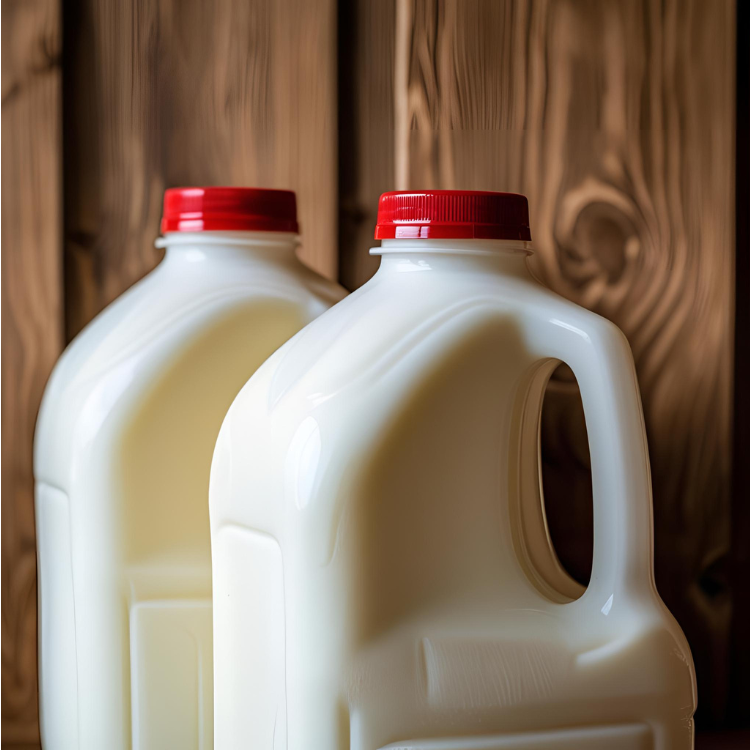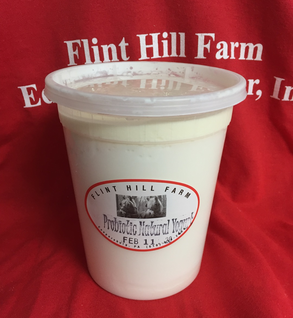My mom never made yogurt at home. She doesn’t like milk actually.
With a fridge full of free milk and only a few little kids to drink it, I took an experienced, mom’s suggestion and learned how to make yogurt at home. By myself.
I failed a few times.
Sometimes it was too thin.
Sometimes I burned the milk by heating it too fast on the stove.
Often I forget about my pot of milk on the stove until it boils over and makes a huge mess.
Ughh!
But now, my family eats healthy, home made, grass fed milk yogurt almost every day for lunch.
The kids love knowing there is an easy, delicious “pre-made” food they can rely on at lunch time no matter how busy we are.
I love that they are eating beneficial cultures of live bacteria that improves their gut health and soothes any digestive issues.
Learning from Failures: My Journey to Perfect Yogurt
After all my failures and foibles, I can answer almost any question about yogurt.
I’ve also discovered easy ways to make sure my yogurt turns out well every time so you don’t have to experiment and make the same mistakes – unless you want to.
If you are already convinced you are ready to make yogurt, download my recipes: Making Yogurt at Home – Three Ways.
I started making yogurt in my pot on the stove top – which is were most of my mistakes happen.
Two more fool-proof methods are included in my collection of yogurt recipes: Using an Instant Pot and Using a Crock Pot.
No one has any excuse not to start making yogurt this week because you don’t need fancy equipment.
Sustainable Yogurt Making for Emergencies – or when you can’t find your thermometer
Now you know me, I’ve got a tendency toward the traditional and the old fashioned.
To make sure you know how to make yogurt without any technology or gadgets I’ve included my “finger test” at the end of this post.
You’d still want to make yogurt during a power outage or an “EMP, ” right?
Why Make Yogurt at Home with Grass-Fed Raw Milk?
You are already convinced that you want to drink raw milk for the health benefits.
But what if you can’t drink it all time?
The most common question I get asked is “How long does raw milk last?”
I get it. You don’t want to waste this precious food.
Making some of your milk into yogurt allows you to stop worrying about the extra milk going sour before you drink it all.
Getting More Nutrition from Milk: Utilize our grass-fed raw milk efficiently by turning it into yogurt. While drinking large quantities of milk can be overwhelming, yogurt offers a versatile and delicious way to consume more of our farm’s nutrient-dense milk.
Preventing Milk Waste: Don’t let surplus milk go to waste. By fermenting it into yogurt, you extend its shelf life and ensure every drop of our valuable milk is enjoyed.
Enhanced Flavor Experience: Our homemade yogurt is a true delight for the taste buds, far surpassing many store-bought options with its creamy texture and fresh taste.
Suzanne, farm member and Tessa’s assistant, make yogurt with her raw milk every week. Until recently, her family let her enjoy it on her own. They knew how much she raved about it. Her home made yogurt was precious.
A few weeks ago, she made a batch of yogurt before going on a trip, leaving her husband at home with instructions to “please eat the yogurt.”
Aha moment!
Suddenly her hubby knew why she raved about her yogurt. You have to taste it to understand. Now he enjoys the yogurt too.
Health Benefits for Digestion: Yogurt is packed with live probiotic cultures that promote healthy digestion and aid in recovery from illness. It’s gentle on the stomach and often recommended for those recuperating.
Control Over Ingredients: When you make yogurt at home, you have control over the ingredients. Enjoy pure, wholesome yogurt without any unnecessary additives or preservatives.
Perfect for All Ages: From babies to adults, yogurt is a versatile food that can be enjoyed by everyone in the family. It’s easy to digest and offers valuable nutrition for growing bodies.
The kids who leave home still crave the fresh, raw milk and home made yogurt. One son with digestive issues also eats the yogurt at Suzanne’s house and is wondering how he’ll be able to get it now that he’s moved out. Here’s the recipe for you, son!
Enjoy Warm or Chilled: Freshly made yogurt straight from the pot is a delightful treat, especially on cooler days. It’s comforting and nourishing, whether enjoyed warm or chilled.
Extra Tips from Tessa: Your Yogurt-Making Questions Answered
Here are some additional insights and answers to common questions about making yogurt at home with our farm’s grass-fed raw milk:
Q: Do I need to sterilize the equipment before making yogurt? A: While it’s not mandatory, sterilizing your equipment can help ensure a clean environment for the fermentation process, reducing the risk of unwanted bacteria interfering with your yogurt culture.
Q: What equipment do I need for making yogurt? A: For a basic setup, a large pot with a thick bottom is essential to prevent scorching when heating the milk. If using specialized methods like the Instant Pot or Crock Pot, ensure you have the appropriate appliance on hand.
Q: How do I handle milk if it gets scorched or burnt during heating? A: If you accidentally scorch the milk, taste it. If it’s not too burnt, you can still use it for yogurt. Otherwise, it’s perfect for feeding animals.
Q: What should I do if my yogurt doesn’t thicken properly during incubation? A: If your yogurt doesn’t set properly, try straining it through cheesecloth to remove excess whey and achieve a thicker consistency. Alternatively, you can heat the milk again with a new starter culture and try the process again.
Q: I noticed a yellow liquid separating from my yogurt. What is it, and can I use it? A: The yellow liquid is whey, which is nutritious and can be used in various recipes like smoothies or baking. It’s packed with protein and adds a tangy flavor to dishes.
Q: Should I skim the cream off the milk before making yogurt? A: Skimming off the cream is optional. Leaving the cream in the milk will result in a creamier yogurt. If you prefer a lower-fat yogurt or want to use the cream for other purposes, feel free to skim it off before heating the milk.
Q: Can I eat yogurt warm, fresh out of the pot? A: Absolutely! Freshly made warm yogurt has a delightful, comforting taste. Feel free to enjoy it warm or chill it in the refrigerator for a few hours before serving.
Three Methods to Make Yogurt at Home
Discover three easy ways to make yogurt using our grass-fed raw milk:
- Instant Pot Method: Utilize the convenience of an Instant Pot for a fuss-free yogurt-making experience.
- Crock Pot Method: Make yogurt in a slow cooker (crock pot) with minimal effort.
- Stovetop Method: Use a simple stainless steel pot on the stove for traditional yogurt-making.
Download the Detailed Recipes
The Finger Temperature Test
This experiment was all about sustainability.
In preparation for teaching my first yogurt class in my farmhouse kitchen, I asked “How could you tell the temperature of the milk without a thermometer?”
My kitchen thermometers are always getting lost, losing battery charge and inexplicably, just not working, even when they don’t seem to be “broken.”
Frustrating, right?
Since homemakers have been making yogurt for many years without instant read thermometers, there must be a way.
In an old fashioned cook stove recipe book I learned how to put my hand in the oven to test the temperature of the oven. The longer you can keep your hand in, the cooler the temperature is.
Thus my “finger method” of testing my hot milk was discovered.
> 1 second
If I can submerge my index finger up to the first knucle for longer than one second, the milk is not over the 180 mark for heating the milk for yogurt.
< 1 second
If I can submerge my finger in the hot milk for one second or less, the milk has reached 180.
>20 seconds
When I can hold my finger in the warm milk for 20 seconds or more and my finger feels warm to hot while submerged, the milk is 110 – 120. This is a good temperature range to introduce your yogurt culture.
You might have a different heat tolerance than me but this should be a good guide. Use your own finger to test your milk at different stages in order find out how close a match your experience is.
Ready to get started?
Download our detailed recipes for making yogurt at home using the Instant Pot, Crock Pot, or stovetop method. Whether you’re new to yogurt-making or looking for a different approach, these recipes will guide you through each step. Enjoy the farm-fresh goodness right in your kitchen!
As Always…
We support your desire to have a good, healthy way of life and food on your table that supports that goal.
We’ll keep farming for you!
Reuben and Tessa DeMaster
Willow Haven Farm





